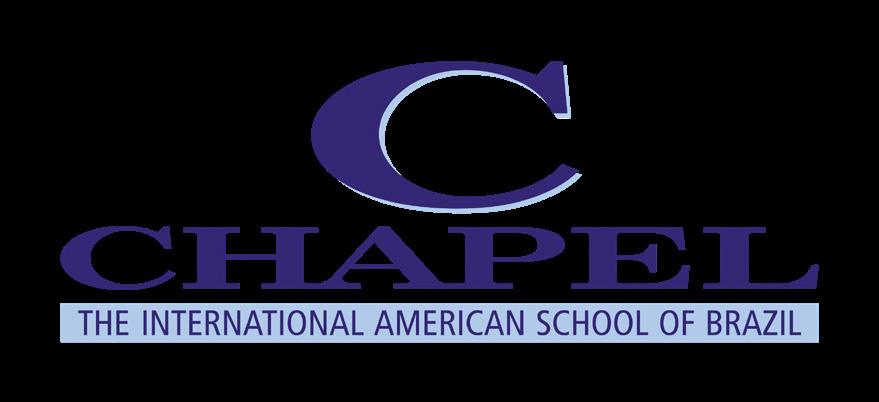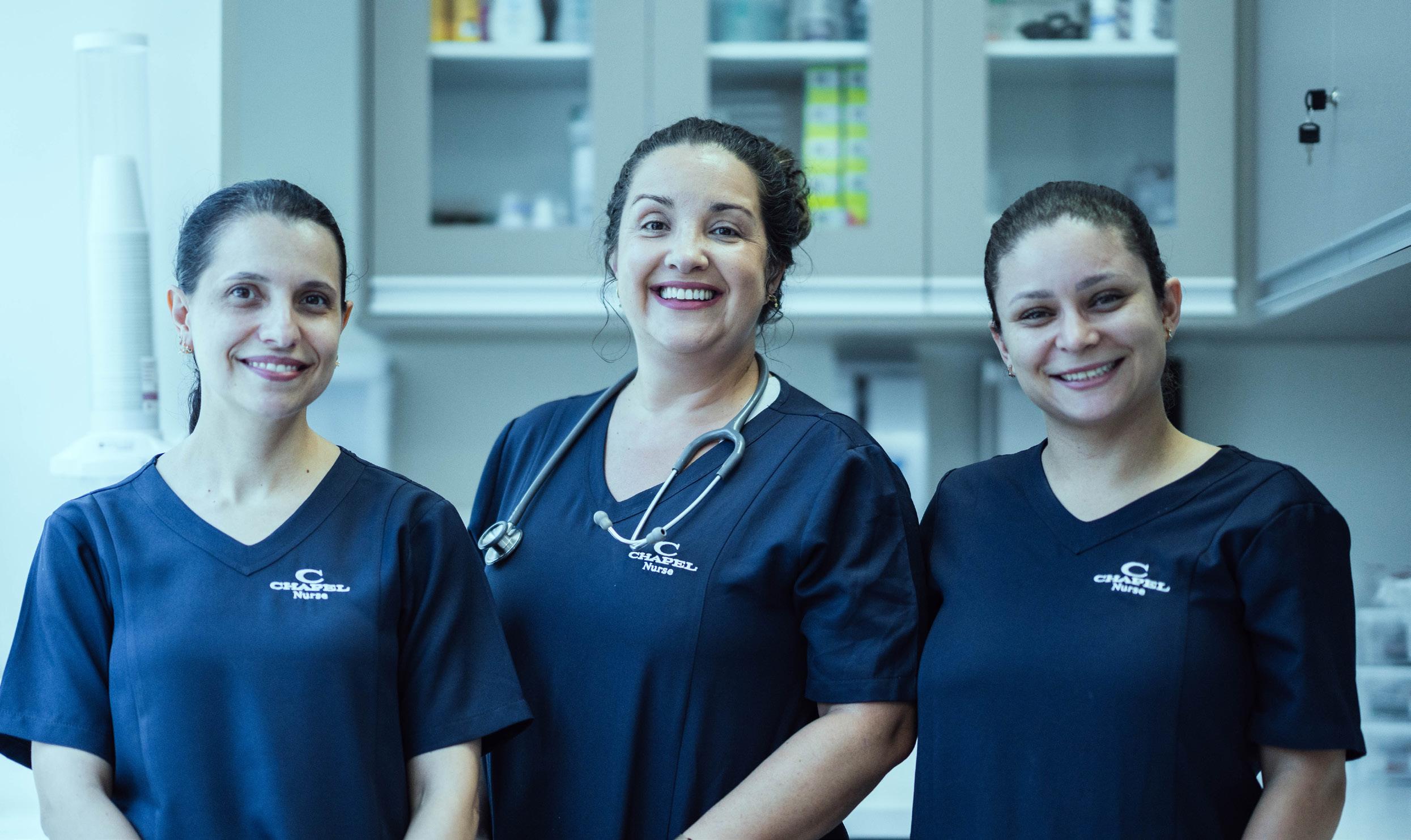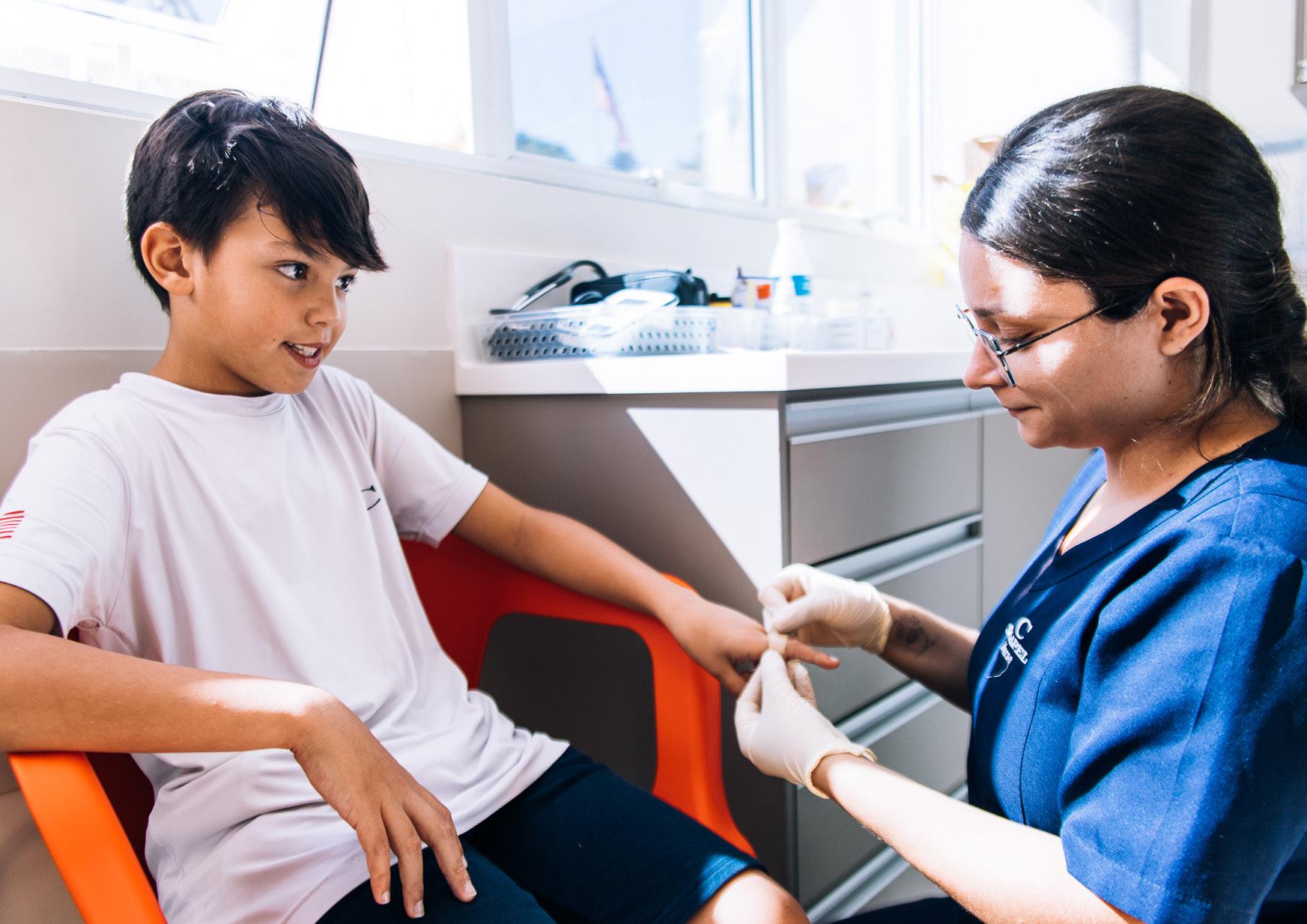Quality Assistance That Strengthens Bonds
Chapel’s Health Service has an infirmary stocked with materials and equipment for first aid care. The team consists of three very competent nurses qualified to provide a high standard of care to students or employees who may be facing a health issue, or have sustained an accident on campus. Experienced in providing urgent and emergency adult and pediatric care, Chapel’s nurses have been certified in advanced training courses, including Advanced Cardiovascular Life Support (ACLS), Pediatric Advanced Life Support (PALS), and Advanced Trauma Care for Nurses (ATCN), all endorsed by the American Heart Association. The nursing team works daily from 7:30 am to 7:00 pm – it is one of the first to arrive and one of the last to leave school. In addition to being present during school hours, they watch over all the events, including those held on weekends, during the academic year.
Daily Care
The nursing team provides comprehensive support to students, teachers, and employees, whether by dispensing prescribed medication to students undergoing medical treatment, by dealing with day-today complaints, or by providing qualified aid in the event of more complex trauma and/or injuries. The fully outfitted and well-organized infirmary has a room with comfortable armchairs to accommodate those who might need to rest for a while. There is also a room for dressing wounds and administering medication, and a separate area for cases that require isolation. The standard at Chapel’s infirmary has been set to provide a safe environment for the school community, and build a bond with the children to make them feel supported at the school in all scenarios.
Personalized Follow-up
Chapel has a health management platform which gives nurses access to individual medical records for the entire school community, including those who have never stepped inside the infirmary. The platform gives the school nurses a quick summary of a student’s health record, including their health history, prior surgeries, drug allergies, dietary restrictions, medications, prior infirmary visits, and doctors’ notes. The system is supplied with personal information taken from health forms filled out by student guardians at enrollment or re-enrollment, and is updated throughout the academic year whenever changes are informed.
This way, whenever students seek out the infirmary, their assessment focuses on their complaint, and their vital signs are checked. After assessment and intervention, the system is updated, and parents are contacted by phone so that everyone can partake in shared and safe patient care treatment.
When no contact is made by phone, the nurse sends a printed report of the visit (in the event of light abrasions, insect bites, minor trauma, etc.) to the guardians so that they can follow up and be informed of the visit.
Urgent Care and Emergencies
Chapel has the staff, equipment, and materials required to dispense urgent and emergency care throughout the school’s campus. Every year, the entire team of teachers and assistants take a first-aid training course.
The school has taken on the services of a medical transportation company that provides support for occasional remote medical services. Knowing that incidents and accidents may occur at any time, it is important to know that the help of doctors and nurses during transport to a local care facility will proceed safely and quickly whenever called for. Should a student need to be relocated to a health service referred by their guardians, a Chapel nurse will stay with the child until a family member or guardian arrives on the scene.
Frequently Asked Questions
What is the procedure when a student becomes ill?
He/She is taken to the infirmary, where vital signs are checked and an initial nursing assessment is made to identify the severity of the condition. The family is contacted and advised if a medical evaluation is needed.
Can I send my child to school with a fever or sick?
No. Children who have a fever must abstain temporarily from attending school. The recommendation is that the child return to school 24 hours after the fever ceases, without using fever-reducing medication.
My child is taking medication that needs to be given during class time. What do I do?
Students’ guardians should always drop off medications at the infirmary with a dated doctor’s prescription, so that the medication can be taken safely, observing the correct dose and at the appropriate time. We do not recommend sending medications in backpacks, because this could lead to incidents such as tampered packaging or even accidental ingestion.
If my child is injured at school, how does the school handle it? How does it let parents know?
The first step is assessment. In low-complexity situations, the nursing team will keep the student in the infirmary for a while to confirm the seriousness of the injury. At this time, bandages or ice packs might be used, for example. The family is contacted, and, if it is the case, the team will ask someone to pick up the child and take him/her to be evaluated medically. In more serious cases, the family is contacted immediately, and an ambulance is called to relocate the student to the referral hospital or emergency room.
Is there any protocol for outbreaks or epidemics? How does the school handle these situations?
Chapel’s nursing team has protocols for seasonal illnesses, which are monitored from classroom to classroom. In case of an infectious disease, the nursing team immediately informs all the families in the affected classroom, and tracks the progression of students and teachers until the student returns, to prevent widespread contamination.
Is there a protocol for when a student has mobility restrictions?
Students with mobility restrictions have crutches and a wheelchair at their disposal. They have permission to use the elevator, and can be accompanied by an aide if needed. The nursing team can provide any required therapy daily as per the guardian’s request, including applying ice packs or administering medications, according to medical prescription.
Can nurses give my child medication before speaking to me?
No. The child will only be medicated after contact is made with the family. Therefore, we recommend that the contact information for guardians be kept updated in the student’s file. Health information, including allergies and medication previously authorized to be administered at the school, should also be kept current.
The only exception is fever. Should the nursing team be unable to contact a guardian –by phone, email, or message – within 15 minutes, the child will be given the medicine referred by the family on the health form.
How does the school conduct emergency cases? What hospitals are students referred to?
In the event of an emergency, the student will be sent to the hospital referenced on the health form after the family is contacted by phone. Transportation is always carried out by the hospital emergency service in an ICU ambulance with a doctor and nurse. Someone from Chapel’s nursing team will accompany the student to the hospital in the ambulance, and stay with them until a family member arrives.
Guiding Statements
Mission Statement
In a caring and academically challenging environment, Chapel provides an American-style education to an international student body. Through Christian values, students learn to make informed decisions, to own responsibility for personal actions and community needs, and to respect life and cultural diversity.
Shared Vision Statement
Engage. Challenge. Support. Care. Prepare students for life.
Motto
“Faith in Education.”
Definition of Learning
“Learning is a unique and lifelong process sparked by the interests, curiosities, interactions, and experiences of the individual. It builds on previous knowledge and leads to making meaningful connections. It is the process of understanding and acquiring knowledge, skills, and dispositions as well as being able to apply them to different settings and contexts. It involves learner development as a whole addressing social, emotional, cognitive, and physical dimensions. Learning has a higher purpose to positively impact society.”
Definition of Internationalism
“Chapel School is an accepting and inclusive environment that respects and embraces cultural uniqueness and diversity. We seek to create an open-minded community while making connections between different perspectives, beliefs, and nationalities to promote a sustainable future in all its dimensions.”












